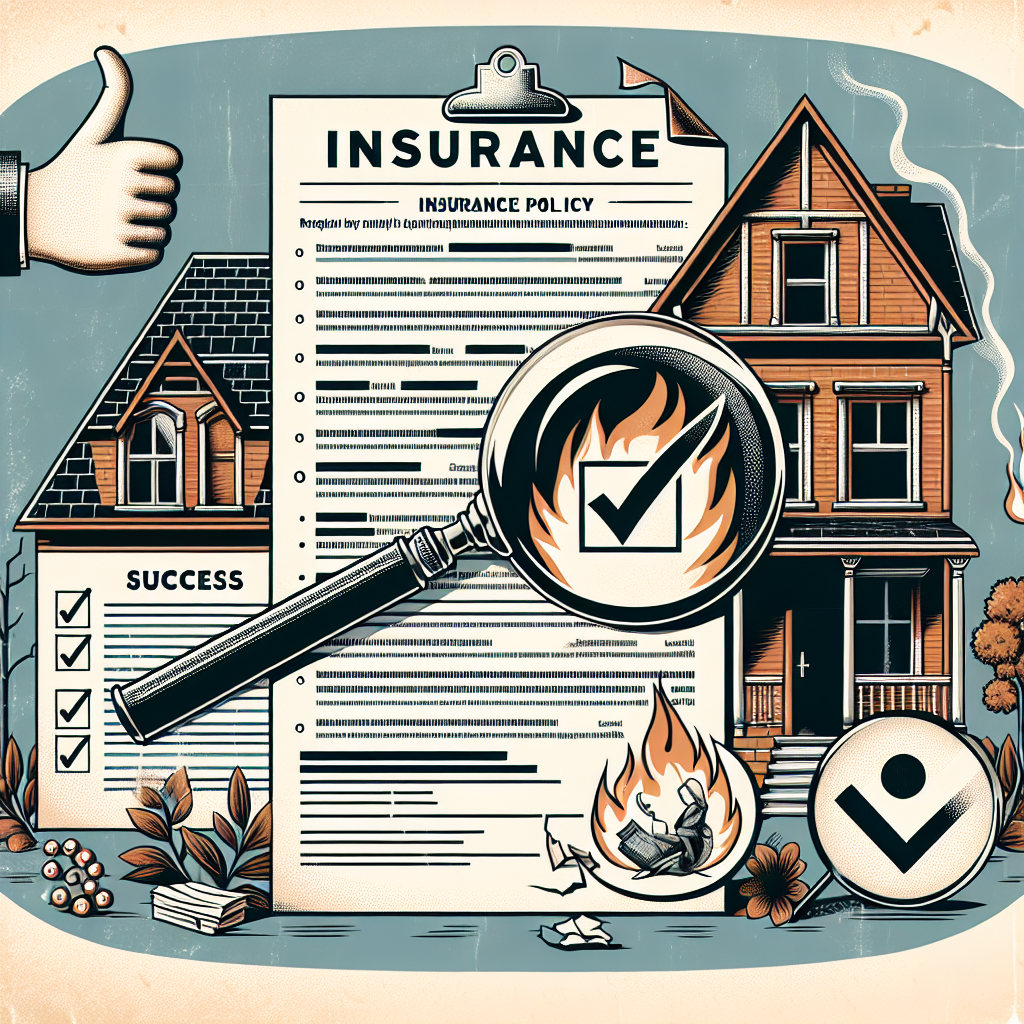Filed under Home Insurance on
Expert Tips for Fire Damage Insurance Claim Success

Filing a fire damage insurance claim can feel overwhelming, but knowing the right steps to take can make a significant difference in achieving a successful outcome. Whether you're a homeowner or business owner, understanding the intricacies of fire damage insurance claims will provide you with the confidence needed to navigate this often complicated process. This guide will provide expert tips to enhance your chances of a successful fire damage insurance claim.
Understanding Your Insurance Policy
The cornerstone of a successful fire damage insurance claim is a thorough understanding of your insurance policy. Familiarize yourself with what your policy covers, including any specific clauses related to fires. Policies can vary greatly between insurance providers, so knowing precisely what is included will help you manage your expectations and avoid any surprises.
Coverage Limits
Pay attention to the coverage limits within your policy. Some policies may cover the full cost of repairs, while others might only cover a portion. Having a clear understanding of these limitations is crucial when assessing the damage and estimating repair costs.
Policy Exceptions
Be aware of any exceptions in your policy that might exclude certain types of fire damage. These could include fires caused by negligence or specific natural events. Understanding these exceptions will prevent future complications when filing your claim.
Documenting the Damage
Documentation is key to a successful fire damage insurance claim. Properly documenting the damage can make a significant difference in the outcome of your claim. This process should begin as soon as it is safe to return to the property.
Taking Photographs and Videos
Capture clear, detailed photographs and videos of all damage. This visual evidence is critical in demonstrating the extent of the damage to your insurer. Ensure you cover all areas, focusing on severely affected sections and providing context by including shots of entire rooms.
Keeping Records
Maintain a detailed record of all communications with your insurance company and other relevant parties. Include written estimates, receipts for expenses incurred, and any related correspondence. This will help establish a clear timeline and reference point for all parties involved.
Immediate Actions Post-Disaster
Immediate actions taken post-disaster can influence the success of your fire damage insurance claim. Ensuring the safety of the premises and initiating appropriate actions are pivotal steps.
Ensuring Safety
First and foremost, make sure that the property is safe to enter. Contact the local fire department to verify its structural integrity. Do not re-enter the building until it is declared safe.
Preventing Further Damage
Once safety is confirmed, take measures to prevent additional damage where possible. This could include covering exposed areas with tarps or boarding up broken windows. Insurers often require policyholders to mitigate further damage as part of their obligations under the policy.
Filing the Claim
Filing the actual fire damage insurance claim is a step that requires attention to detail and precision. Here’s how to ensure your application is both thorough and compelling.
Prompt Notification
Notify your insurance provider about the fire damage as soon as possible. Timeliness is critical, as many insurance policies have specific timeframes within which you must file your claim. Immediate notification will also expedite the scheduling of an adjuster's visit.
Completing Claim Forms
If your insurer requires claim forms, fill them out accurately and comprehensively. Double-check all the details you provide, including any inventory lists and documentation of the damage. An accurate submission will facilitate a smoother claims process.
Working with Insurance Adjusters
Insurance adjusters are pivotal in the claims process, acting as the liaison between you and the insurance company. Knowing how to interact with them can impact the outcome of your claim.
Preparation for Meetings
Prepare thoroughly for meetings with insurance adjusters. Ensure you have your documentation organized and readily available. Present the evidence clearly and professionally to support your claim.
Communication Tips
Effective communication with the adjuster is crucial. Be clear, concise, and honest in your interactions. Address any of their questions promptly and provide any additional information they may request. A collaborative approach often yields the best outcomes.
Negotiating Settlements
There may be times when you receive an initial settlement offer that does not meet your expectations. In such cases, negotiating settlements effectively becomes paramount.
Assessing the Offer
Begin by carefully evaluating the insurer’s settlement offer. Compare it with your documentation and assessments of damage. If the offer is lower than anticipated, prepare a counter-argument supported by your records.
Professional Assistance
If needed, consider hiring a public adjuster or a professional mediator. These experts can analyze the damage comprehensively and negotiate directly with your insurance company to achieve a fair settlement. Such support can be crucial in cases involving significant claims.
Learning from Industry Trends
Keeping abreast of recent industry trends can provide insights into handling fire damage insurance claims more effectively. Understanding these trends might also highlight any recent changes in insurance practices or common pitfalls to avoid.
Emerging Fire Safety Standards
Be aware of any new fire safety standards or building regulations that could affect your insurance policy or claim. Compliance with these standards might not only mitigate damages in future incidents but can also influence your insurance premiums and coverage options.
Insurance Policy Advancements
New types of insurance policies or policy riders designed to cover a broader range of fire-related incidents are continually emerging. Keeping updated on these advancements ensures that your coverage remains comprehensive and competitive.
Conclusion
Securing a successful fire damage insurance claim involves a strategic blend of preparation, documentation, and communication. By understanding your policy, documenting damage meticulously, acting promptly, cooperating with adjusters, and negotiating effectively, you can significantly enhance your chances of a successful claim. Staying informed on industry trends and seeking professional advice when necessary can further secure your path to a fair settlement. Implement these expert tips into your claims process to navigate the complexities of fire damage insurance successfully.





